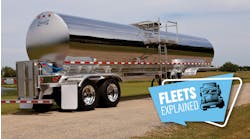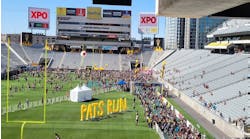Transporting arms, ammunition and explosives for the military is a major part of Trism's extensive North American operations, which also include heavy hauling and hazardous-materials transport. In fact, the Trism Secured Transportation group — the munitions and hazardous-materials arm of Trism — has more than 25% of the military munitions market.
The carrier got its start in truck transportation in 1990 when it acquired Tri-State Motor Transit. Today, Tri-State and two additional Trism operating companies — Diablo Transportation and C.I. Whitten Transfer Co. — make up the Trism Secured group.
On the munitions side, there are 215 tractors and 674 trailers at the disposal of Trism Secured, for which 339 company drivers and 86 owner-operators haul freight. According to Eddie Prince, senior vp-maintenance and equipment purchasing, the munitions division utilizes all 42 of Trism's nationwide terminals and drop yards, which include 7 such maintenance facilities.
“The military is very strict about equipment and driver safety,” Prince explains. “Trism Secured's tractors are required to have larger-than-average fire extinguishers both in and outside the cab. Explosives are often moved on “twistlock” trailers, which have built-in fasteners that lock preloaded containers into place. Munitions are carried in vans that are locked and sealed by the shipper according to military specifications.
A number of security measures must also be provided by carriers hauling military freight classified as “secret,” including all munitions. “Our power units, for example, are equipped with Qualcomm two-way satellite communications systems with a panic button linked directly to the military,” Prince reports.
Prince also points out that two drivers are always used for these types of shipments; during stops, only one member of the team leaves the truck at a time so the cargo is never left unattended. The only exception is for stops at approved revetted areas with full-time security available such as at Trism's Joplin, MO, facility.
“Sensitive freight is policed by the military very closely,” Prince says. “They routinely send unscheduled escorts to follow our trucks and monitor our performance and compliance with regulations. You simply have to have the best drivers on these types of high-security runs.”
Getting involved
Fleets that wish to contract with the military for transporting DOD (Dept. of Defense) freight, including munitions/explosives, must first be qualified and DOD-approved. The Military Traffic Management Command (MTMC) is currently streamlining its procedures to simplify the application process for interested carriers. “The new Carrier Qualification Program's ultimate goal is to qualify carriers within 24-48 hours of submission of the required documentation,” says Jim Gilmore, chief of the Carrier Service Div. of MTMC's Deployment Support Command (DSC), which manages the program. The new web-based process is currently being tested with several authorized carriers.
According to Cynthia Perkins, a traffic management specialist with MTMC's Deployment Support Command at Fort Eustis, VA, before a carrier can be authorized to transport munitions or any other sensitive cargo, it must be in the DOD freight program for 12 months, with satisfactory performance hauling general commodities.
Applications for fleets interested in the Carrier Qualification Program can be downloaded from the MTMC DSC web site: www.dsc.mtmc.army.mil. Click on “Carrier/Perf/Qual” to review current program requirements. Fleets needing assistance may contact Cynthia Perkins at 757-878-7432 or Demitrous Blount at 757-878-7435.


